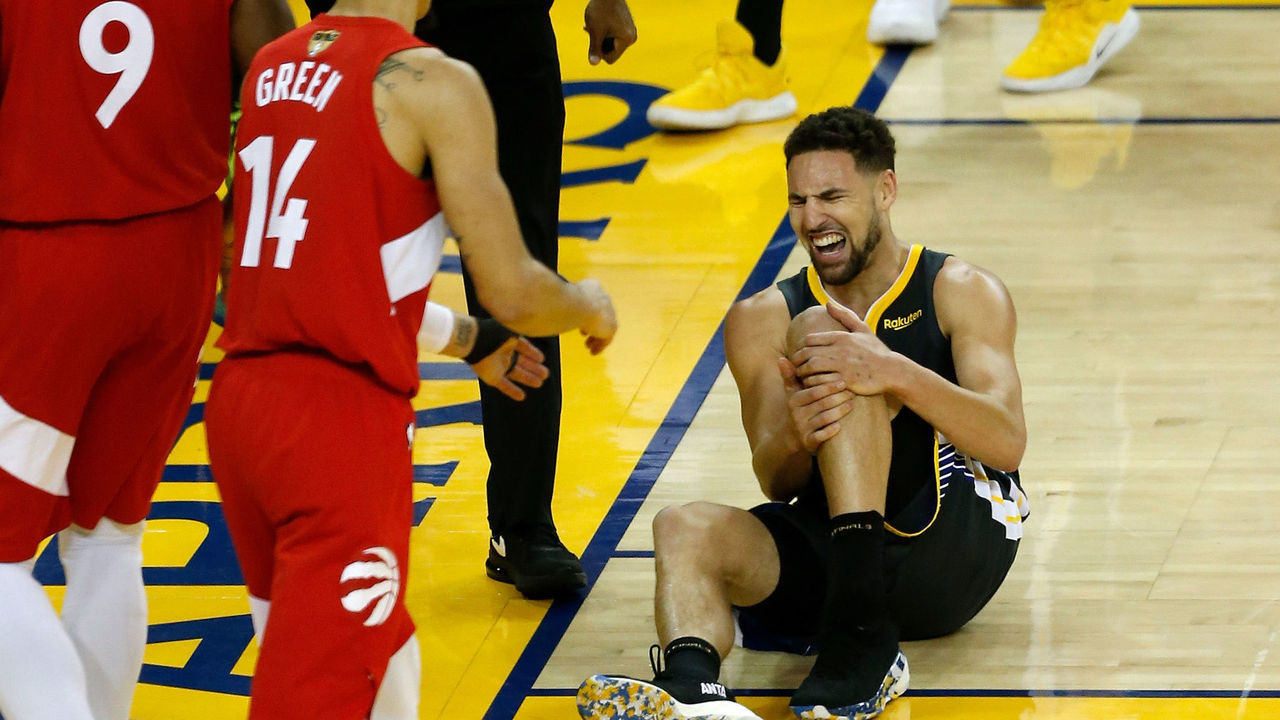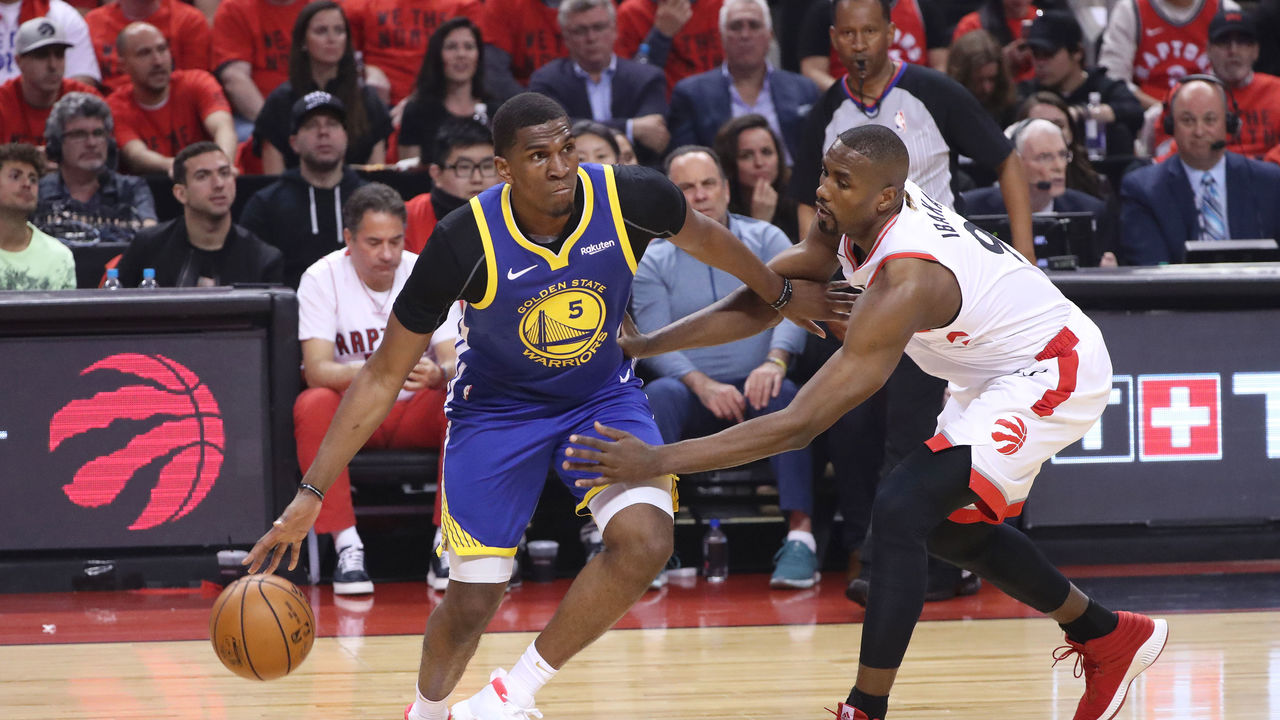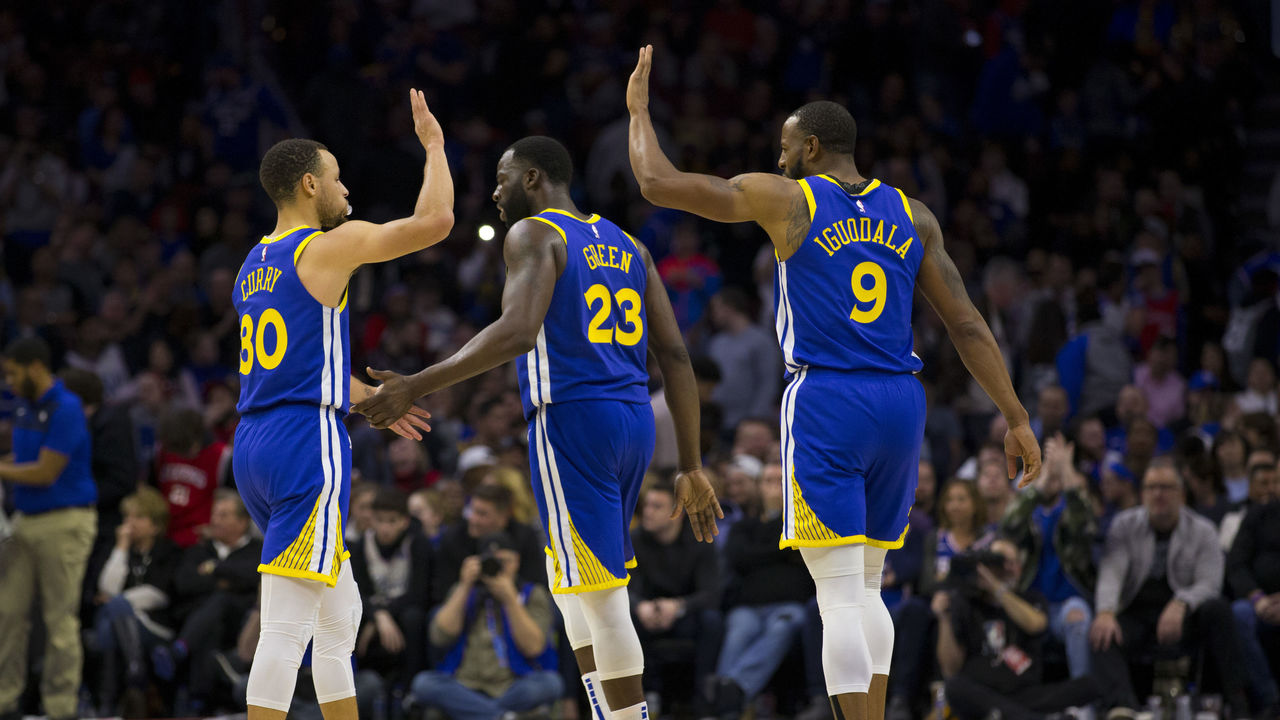What happens to a dream team deferred? The Warriors are about to find out
No dynasty comes together without a healthy dose of luck, and the Golden State Warriors had no shortage of it in building theirs.
Whether it was the Timberwolves drafting two point guards ahead of Steph Curry in 2009, Curry signing an absurdly team-friendly deal because his restricted free agency coincided with a run of ankle sprains, the Warriors getting Andre Iguodala as a consolation prize for Dwight Howard in 2013, Klay Thompson and Draymond Green signing extensions just before the 2016 salary-cap boom, or that once-in-a-generation spike coinciding with Kevin Durant's free agency (and the Warriors having the space to sign him thanks to all the aforementioned bargain contracts), a ton of factors had to line up to make their half-decade run of dominance possible. So much had to go right.
Then their good fortune evaporated in a span of about 72 hours when the Warriors lost two of their dynasty's pillars to long-term injuries in back-to-back NBA Finals games - Durant to a ruptured Achilles in Game 5, and Thompson to a torn ACL in a season-ending Game 6 loss. Both are set to become unrestricted free agents, and both may miss the entire 2019-20 campaign. Golden State is suddenly staring at a complicated offseason and a difficult road ahead.
The team has been preparing to proceed without Durant anyway, but it's long been assumed that Thompson would re-sign. His injury doesn't appear to have changed that, though the Warriors may not feel as comfortable giving him a max contract as they did a week ago. Odds are they'll offer him one anyway, because Thompson has been an indispensable part of their on-court success and organizational culture. He's never dealt with an injury this severe, but it surely helps that he's proven remarkably undeterred by physical ailments in the past. To wit: He suffered a hamstring strain earlier in The Finals, returned after missing just one game, and played some of the best basketball of his career before injuring his knee in the middle of a(nother) transcendent Game 6 performance.
Giving Thompson the bag is probably the right move, but paying him upward of $32 million to potentially not play a single game next season will probably torpedo the Warriors' chances of winning the West for a sixth straight year. It's likely going to put them in the luxury tax even if they don't retain Durant, which means they won't have access to the full mid-level exception. (Though if it's determined that Thompson will indeed miss the entire season, the Warriors can apply for a disabled player exception and get an extra mid-level salary slot).

We shouldn't close the door on a Durant return, and Warriors ownership has shown a willingness to spend deep into the tax. But footing a historic bill for a team that may not be projected to make it past the first round next season would be a tough pill for even the light-years crew to swallow. And that's without accounting for the risk in maxing out two mid-career players coming off transformative injuries, or factoring in Green's free agency in 2020, when he may be super-max eligible.
Curry and Green still represent one of the game's very best two-man batteries, but there won't be much wiggle room to bolster the roster around them, and in The Finals, we saw how limited this Golden State team is when Thompson and Durant are unavailable. The Warriors clearly need to use whatever flexibility they have to add more shooting. If they don't, we might actually see the rest of the NBA catch the Nick Nurse wave and box-and-one Curry all season. Surround the Curry-Green pick-and-roll with capable shooters and you still have the ingredients of a top-three offense.
But losing Thompson also represents a significant blow at the defensive end, where the Warriors no longer have someone to stick on the opposing team's top perimeter threat. (Iguodala is still capable, but asking him to fill that role for more than 25 minutes a night, in his age-36 season, is simply asking too much.)
Though the offseason won't bring any splashy additions, there should be plenty of guys available for the mid-level or the taxpayer's mid-level whose marginal two-way impact can pay big dividends. (Think Trevor Ariza, Rudy Gay, Reggie Bullock, Wesley Matthews, Seth Curry, Rodney Hood, or Patrick Beverley.) It will be difficult to nab one of those guys if the Warriors aren't willing to offer multi-year deals, which is a strong possibility given the tax bill that likely awaits them in 2020 and beyond. Maybe they can find an extra dash of affordable production with the 28th pick in the draft, or package that pick with Shaun Livingston's partially guaranteed $7.7-million contract in a trade for more immediate, short-term help.
Beyond that, they're looking at filling out the roster with minimum contracts. You never quite know who will be willing to sign for the minimum, but there's always a cadre of quasi-useful vets looking to latch on with a competitive team, much like David West did with Golden State in the past. (Think Jared Dudley, Vince Carter, Jeff Green, or Iman Shumpert.)

I've mentioned guards and wings almost exclusively because that's ostensibly where the Warriors need the most help, but their big-man corps could wind up just as depleted, with Kevon Looney and DeMarcus Cousins also set to hit unrestricted free agency.
Looney emerged as a vital piece this season - Steve Kerr even called him a cornerstone - and was easily the most reliable big on the roster. He's limited offensively, but he's a strong rebounder and a smart, mobile defender who offers some switchability. Losing Thompson and Durant, however, might change the Warriors' calculus at center. Once, all they needed at the position was someone to set solid screens, grab the odd offensive board, and chill in the dunker spot waiting to catch lobs. Now, they might be looking for someone who brings a bit of playmaking and independent scoring juice. They'd surely love to have Looney back regardless, but those changing needs might make the Warriors less likely to meet his market price.
Cousins offers the offensive skill Looney lacks, but his hampered mobility and lift in the wake of last year's Achilles injury made him a liability at the other end - a constant point of attack for opposing offenses. Perhaps more pertinently, the Warriors don't own his Bird rights and can only offer a modest raise on the $5.3 million they paid him this past season. Even if they believe that another few months of distance from the injury (and the quad strain that derailed his postseason) will help him return to his All-NBA form, they might still get priced out of the bidding for his services.
It's possible, if improbable, that neither of them returns. The Warriors might decide they can get better bang for their buck on the center-saturated open market. Maybe they're ready to hand the full-time starting job to Damian Jones or Jordan Bell, or still believe in Andrew Bogut. For now, they have a big question mark in the middle.

They have question marks all over, really.
The Warriors were top-heavy even when Durant and Thompson were healthy; what happens when guys like Green and Iguodala can no longer afford to coast through the regular season? Their defense was already slipping; can they collectively pick up the slack with increased effort alone? Curry will have to revert to the higher-usage, more ball-dominant role he played before Durant's arrival forced him to adapt; will his efficiency suffer, or will he replicate the production that earned him back-to-back MVP nods in 2015 and '16?
The question looming over all of this: How good can the Warriors be while they wait for Thompson (and possibly Durant) to convalesce? Next season, we were supposed to find out whether their original championship core could reach those same heights four years later. Now, the club famous for having perhaps the largest margin for error of any team in history has seen that margin shrink to almost nothing. The Warriors simultaneously seem capable of contending for a Western Conference crown and missing the playoffs. Health will be a huge factor. It could be a defining season for Curry, Green, and Kerr.
Regardless, the Warriors are overwhelmingly likely to end up watching The Finals from home for the first time in a half-decade. There's a universe in which Thompson and Durant both re-sign and this becomes a mere bump in the road. But until we know whether those players are coming back, and the condition they're in if and when they return to action, we won't know whether the coming season is a stopgap year or a transitional one; whether Golden State's dynasty has been derailed, or simply deferred.
HEADLINES
- Embiid drops season-high 39, leads 76ers past Pacers with Maxey out
- Curry scores 39 in return, but Warriors fall to Timberwolves
- Mitchell scores 24 of his 48 points in 4th Q as Cavs come back vs. Wizards
- Morant returns from 10-game absence in Grizzlies' loss to Jazz
- The Spurs are growing up, Keegan Murray is stuck, NBA Cup matters